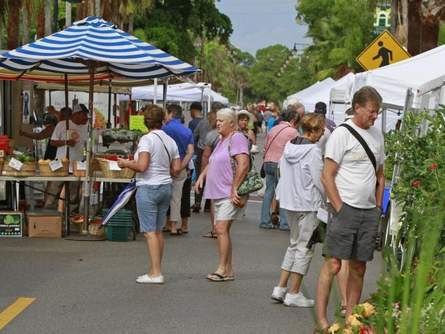 |
Supplemental Nutrition Assistance Program
Venice and 19 other farmers markets in the state will now accept EBT cards for the Supplemental Nutrition Assistance Program. Those using them will get a bonus; a SNAP customer who spends $20 in the Fresh Access Bucks program will receive an additional $20 to spend on the fresh Florida food items.
STAFF PHOTO / THOMAS BENDER |
VENICE – Farmers markets in Venice and Englewood are among 20 throughout the state helping low-income families stretch their shopping dollars.
Facts
SNAP program launches
Two south Sarasota County farmers markets will accept Electronics Benefits Transfer payments from people in the Supplemental Nutrition Assistance Program, formerly known as food stamps.
Venice Farmers Market
Where: 200 block of Tampa Avenue, Venice.
When: 8 a.m. to noon Saturdays.
Information: Contact Linda Wilson, market manager, at 234-6321 or
linda.venicefarmersmkt@gmail.com.
Visit:
thevenicefarmersmarket.com
Englewood Farmers Market
Where: 300 block of Dearborn Street, Englewood.
When: 9 a.m. to 2 p.m.
Thursdays, October through May; official launch of SNAP program is Oct. 16.Information: Contact Lee Perron, market manager, at 548-7843 or
info@englewoodfarmersmarket.org.
Visit:
englewoodfarmersmarket.org
The program, developed by Florida Organic Growers, aims to get fresh, local foods to people in the Supplemental Nutrition Assistance Program, formerly known as food stamps, and to support local growers.Customers will swipe their Electronics Benefits Transfer cards at a machine at the market and receive tokens to pay for fruits and vegetables purchased from vendors. For each $1 they spend, they receive anadditional $1, up to $20.By doubling their buying power through the Fresh Access Bucks program, the goal is to help combat food insecurity throughout the state, said Carmen Franz, a program organizer with Florida Organic Growers.“The hardest part of these programs is letting people know it exists,” Franz said.Her organization targeted markets in urban areas deemed “food deserts” near transportation lines.Linda Wilson, manager of the Venice market, and Lee Perron, the Englewood market manager, worked together to bring the incentive program to the area.“Our hearts are in it for our communities,” Wilson said. “We share that same type of vision. We both try to go above and beyond what most managers do.”The managers are developing personal touches to teach customers about food options, getting volunteers to leadmarket tours, handing out recipe cards, helping people learn how to prepare food at home themselves and offering children’s programs.Robert Kluson, Ph.D., an agriculture and natural resources extension agent, leads monthly sessions at both the Venice and Englewood markets.“We’re trying to introduce people to more varieties of foods they may not be aware that we can grow in Florida,” he said.He said he learns from managers about community needs and also works with the health department about how fresh food can be part of the solution for health issues.“It’s not only bringing fresh food to people in greatest need, it increases the vitality and success of the farmers markets way beyond SNAP recipients buying there,” Kluson said.He said the new program rewards vendors with an increased customer base.“I love helping out the community and giving back,” said Dustin Thibodeau, of Fort Myers, who operates Dusty’s Produce at the Venice market. “They’re supporting us as local businesses.”Thibodeau, 20, has been selling produce since he was a high school sophomore and recently started his own business. He specializes in sustainable products grown with less pesticides and chemicals; he features Florida-grown produce during the season and brings in items from Georgia and the Carolinas in the summer months.The new program helps everyone all around, he said, emphasizing that consuming high-quality, fresh food helps overall health.Everyone is pulling together, Kluson said, including churches, governments, food banks, the health department, farmers and the transit system.“This is just the right thing to do,” he said.Funding is in place to keep the program going for three to five years, Franz said, giving time to create behavior change.The one-to-one match — thanks to funding by the Florida Department of Agriculture and Consumer Services Specialty Crop Block Grant — is an incentive to help people learn the benefits of buying fresh vs. processed food.“The farmers market is truly a nutritious and healthy alternative,” Perron said.
